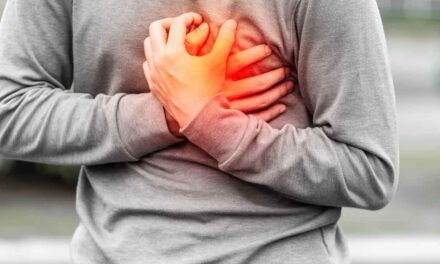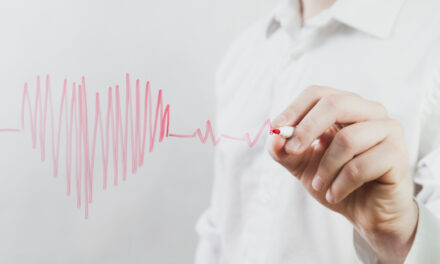Heart Palpitations and a Headache: A throbbing headache is never fun. It can hit you, completely derail your day, and force you to work around your ever-growing to-do list. Add to that other symptoms like a racing heartbeat, and you might not be feeling angry (we see you, multitasking), but also a little anxious.
But don’t be afraid. Although heart palpitations and headaches can have many causes, most are not severe.
Here, you’ll learn more about the connection between headaches and heart palpitations and how doctors say you can simultaneously relieve headaches and heart palpitations.
You’re Stressed Or Anxious
Uncontrolled stress can affect your body in different ways. “Stress can lead to tension headaches, and anxiety can cause your heart to weary too fast or irregularly”. However, according to the Mayo Clinic, anxiety can cause the following symptoms:
- Restlessness
- Jitteriness
- Sweating
- Weakness
- Fatigue
- Shortness of breath
- Dizziness
- GI issues like nausea or diarrhoea
Another possible sign that you’re dealing with anxiety is if you notice your heart racing at night or when you’re not busy.
What to do: Try calming activities such as yoga, meditation, or journaling in your daily routine to lower your stress levels and heart rate. You can also try adding exercises to improve heart rate variability, which can help with heart rate stress.
You’re Dehydrated
Not drinking enough water is a known headache, but did you know it can also make your heart race? When dehydrated, you may also experience fatigue, dry mouth, or darker skin than usual, rendering to the National Library of Medicine.
What to do: The good news is that mild dehydration is usually easy to correct. “Start by drinking water or a drink with electrolytes to restore levels slowly”.
If you’ve been sweating or been outside in hot weather, “resting in a cool, shaded area can also provide relief, as can wearing a cool head and neck wrap”.
Call your doctor right away if you notice signs of severe dehydration, such as confusion, seizures, or rapid breathing.
You’ve Had Too Much Caffeine
Overdosing in coffee or energy drinks can cause head damage, increased heart rate, and feelings of nervousness and nervousness. “Caffeine is a stimulant that disturbs the central nervous system. In some, it can cause the blood vessels in the brain to constrict, causing headaches,” the doctor said. Natbony. Too much caffeine can also increase your heart rate and blood pressure, leading to heart palpitations.
What to do: According to the National Library of Medicine, you will begin to feel better once the caffeine leaves your system. This may take several hours. Meanwhile, drinking more water will help you stay hydrated, as caffeine can dehydrate you.
And if caffeine is causing headaches and heart palpitations, consider cutting back on how much you drink. Bestowing to the Food and Drug Administration, most people can endure up to 400 milligrams of caffeine daily, equivalent to about 32 ounces of coffee. (The caffeine content of energy drinks can differ greatly, so check the label before drinking.)
You Have An Infection
A cold or flu makes you feel sluggish from head to toe, so headaches and heart palpitations are common. “Any disease that causes fever can cause headaches,” he added. And if you’re dehydrated, it can increase your heart rate.
What to do: Your game plan may include drinking plenty of fluids to stay hydrated. According to the Cleveland Clinic, taking over-the-counter pain reliefs such as ibuprofen or acetaminophen can help reduce fever and prevent headaches.
You’re Taking Certain Medications
According to the University of Iowa, Pseudoephedrine, a common over-the-counter medicine used for coughs and nasal congestion, can sometimes make your heart beat faster. Although taking this medication will not necessarily give you a headache, you may be dealing with an existing headache due to an allergy or illness.
What to do: If you are generally healthy and do not have any heart disease, you can take over-the-counter medications as prescribed (or on the label) to relieve nasal congestion. However, call your doctor if your heart palpitations continue for more than 30 minutes or if you poster symptoms such as shortness of breath or dizziness. According to the Cleveland Clinic, they can tell you whether it is safe to continue taking the medication.
You’re Not Sleeping Well
Headaches when you don’t get enough sleep are normal. According to the University of Iowa, closing your eyes a little can also make you feel anxious or tense, which can cause symptoms such as a racing heart.
In terms of weight, getting the right amount of sleep is important for your heart health and can help lessen your risk of diseases like heart attack and stroke, according to Johns Hopkins Medicine.
What to do: Over-the-counter pain relievers such as ibuprofen or naproxen (Aleve) may help control headaches in the short term. However, aim for seven to nine hours of sleep a night to truly feel rested, as the Centers for Disease Controller and Prevention (CDC) recommends. You can try to achieve this:
- Going to bed at the same time every night
- Establishing a relaxing bedtime routine (think: reading, journaling, stretching)
- Creating an ideal sleep environment (i.e., making it dark, calm, and quiet in your bedroom)
You Have An Underlying Condition
Sometimes, headaches combined with heart palpitations are a sign of a more serious health problem, such as thyroid disease or anaemia.
According to the Cleveland Clinic, a specific condition that can cause both simultaneously, called postural orthostatic tachycardia syndrome (POTS), is characterized by a sudden change in blood pressure when you get up from a sitting or lying position and stand up.
Another condition that can cause both headache and heart palpitations, although rare, is called cardiac headache (also known as cardiac cephalalgia), which can occur during a heart attack. Common symptoms of a heart attack include sharp pain on one or both sides of the head, often called “thunder” or “rattle,” according to a review published in March 2016 in Acta Cardiologica Sinica.
What to do: Tell your doctor if you experience frequent heart palpitations. They can do blood work and other tests to rule out and treat underlying conditions. Treatment for heart palpitations and headaches will also depend on your condition. POTS, for example, is treated by drinking fluids throughout the day and adding more salt to your diet, according to Johns Hopkins Medicine.
If you think you are having a heart attack (due to a heart attack), call 911 and go to the nearest emergency room as soon as possible to get treatment.
Can COVID-19 cause heart palpitations and headaches?
Any viral illness that causes dehydration can eventually cause heart attacks and headaches, including COVID, the doctor said. Cutler. So again, try to continue drinking these drinks when you are sick.
It’s also possible to continue to experience headaches or heart palpitations even after you recover from COVID. In this case, your symptoms may be a sign of what’s called chronic COVID, according to the Mayo Clinic. Other common symptoms include the following:
- Fatigue
- Shortness of breath
- Joint or muscle pain
- Diarrhea or stomach pain
Experts are still not entirely sure why it happens more quickly for some people than others, and they are still learning how best to deal with it. Regardless, it’s best to tell your doctor if you think you’re dealing with long-term COVID. According to the Mayo Clinic, they may perform diagnostic tests (such as blood tests, liver function tests, or chest X-rays) based on your symptoms and recommend possible treatment options.
What Causes Heart Palpitations And Headaches After Eating?
Headaches and palpitations after eating can occur for a number of reasons. “Overeating at one time can strain your body, causing your blood pressure to drop, which can lead to headaches and heart palpitations,” the doctor said. Natbony.
For some, certain foods, especially sugary ones, and additives such as monosodium glutamate (found in fast food) and tyramine (an amino acid found in aged cheese and processed meats) may also be triggers, the doctor added. Natbony.
How To Prevent Headaches And Heart Palpitations
Preventing heart attacks and strokes at the same time will depend primarily on what causes them both. However, here are some general tips to help you cope with heart palpitations and improve your overall health.
- Your fluid needs will likely vary depending on your body size, activity level and the climate in which you live. According to the General Library of Medicine, you will know you have good hydration levels if your skin is white or yellow.
- Monitor your caffeine intake: Drinking 400 milligrams or less of caffeine per day is generally fine, but watch how it makes you feel. If you’re nervous, have a headache, or have a racing heart, try drinking the drink and see if you feel better.
- Eat a balanced diet. Eating well throughout the day can help prevent side effects such as headaches and heart palpitations. Eat plenty of vegetables, fruits, lean proteins and whole grains. Try to “avoid large foods that can cause stress in your body,” the doctor adds. Natbony.
- Exercise regularly: Try to be active daily, but don’t overdo it. “Strenuous physical activity can cause heart palpitations and headaches in some people,” she added.
- Find ways to cope with stress. Deep breathing, yoga and meditation are reliable methods but try to find what works best for you and what brings you the most relief.
When To See A Doctor
When to see a doctor about heart palpitations and headaches will depend on the duration and severity of your symptoms and whether you are at increased risk for heart problems.
“Healthy people without heart problems who experience heart palpitations from time to time should discuss their symptoms with their healthcare provider. However, patients with heart problems should call their cardiologist, said Mark Taub, MD, emergency medicine physician and director of emergency medical services at MemorialCare Saddleback Medical. Centre in Laguna. Hills, California.
Of course, call your doctor immediately and go to the nearest emergency room if you experience simple symptoms such as chest pain, trouble breathing, fainting, or rapid heartbeat.
FAQ
Can heart palpitations cause headaches?
“Palpitations usually do not cause any harm to the head,” the doctor said. Taub. But perhaps a rapid heartbeat and then a headache from something foreign. According to the doctor, the typical case is a person with a heart condition that causes heart palpitations. Cutler. This person may take a medicine such as nitroglycerin to control their heartbeat, but a side effect of this medicine may be a headache.
Bottom line? One does not necessarily cause the other, but related or unrelated factors can contribute to increased heart rate and headaches at the same time.
Why does my head hurt when my heart rate increases?
You may be dealing with an underlying problem that is causing both symptoms. Common culprits include stress, dehydration, caffeine, and too little sleep. But because heart palpitations can sometimes be a sign of something more serious, it’s a good idea to tell your doctor if you get both regularly.
Should I Go To The ER for Heart Palpitations?
Not necessary. Many minor things can make your heart flutter, including stress or anxiety, so don’t panic. However, you should contact your doctor immediately if your heartbeat is strong, slow, or accompanied by chest pain, difficulty breathing, or fainting.





